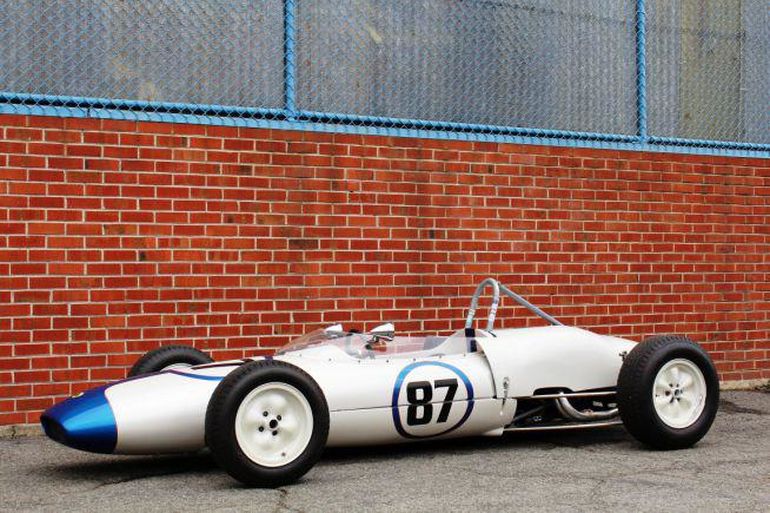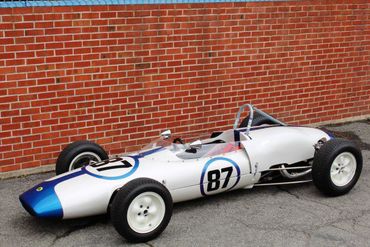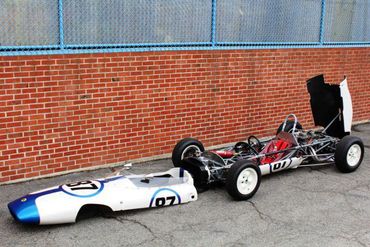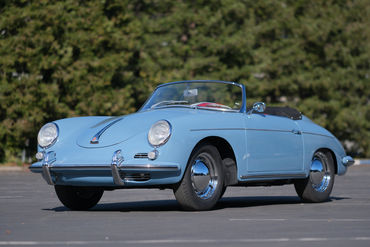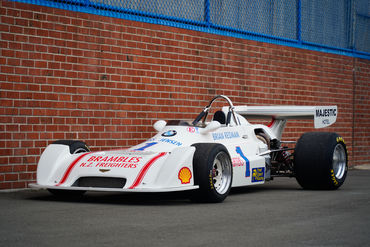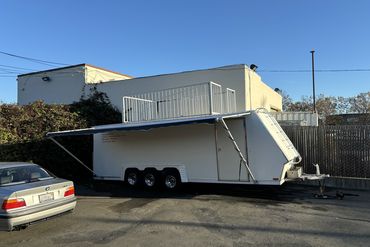Sold
SOLD 09/16
1962 Lotus
22 Formula Junior
Restored and Campaigned in CSRG, SVRA, HMSA and SCCA Events. Track-Ready and Fully Eligible Under FIA and FJHRA Regulations. Spares.
- VIN22-FJ-36 (Arch Motors #68)
- Exterior ColorWhite and Blue
- Interior ColorRed
- MileageTMU
- Engine1098 c.c. Cosworth
- Engine no.462506
- Transmission5-Speed Hewland Mk.4
- StatusSold
- StockFJ1953
Description
1962 Lotus 22 Formula Junior
s/n 22-FJ-36 (Arch Motors #68)
Blue and White Racing Livery
Formula Junior was first adopted in October 1958. The class was intended to provide an entry level class where drivers could use inexpensive mechanical components from ordinary automobiles. The rules for the class required the cars to be powered by production-based engines of 1100 cc with an 880 lb. car. Parts like the engine block, cylinder head, and cylinders had to come from a production car. Twin overhead camshafts, limited slip differentials, and modifications to the number of main bearings were all forbidden. The brakes and transmission also had to be production based. Formula Junior was the first racing class to require roll bars.
The first international Formula Junior championship in 1959 was won by the Swiss driver and engineer Michael May in a Stanguellini. In the UK, Elva produced the 100 series, powered by a BMC A series (Sprite or Mini) engine. The Elva became the first mass produced British Formula Junior car. Lotus also came into the game with their Lotus 18, a simplified derivative of their Formula One and Formula Two chassis, fitted with a 997 cc Ford Anglia engine. Keith Duckworth of Cosworth Engineering took an interest in Formula Junior and developed the 1959 Ford Anglia engine. Lotus also raced the Lotus 20, Lotus 22, and Lotus 27 in the Formula Junior class as the series developed.
Through the Formula Juniors’s lifetime the number of manufacturers increased, and in1963, there were close to 500 in existence. Brabham’s first racing car was the mid-engine BT1 in 1961. By 1963, the class had become expensive, the amateur or homebuilt cars diminished, and the cost of tuning an engine to get up to 120hp was getting too high! The 1963 series was the last series in the UK and Europe.
The Lotus 22 was built by Lotus cars between 1962 and 1965, with total of 77 cars constructed. It was developed from the 1962 Lotus 20; with the major differences of disk brakes all around, a top link to the rear suspension, and a dry sump engine that was canted over to lower the center of gravity. The 22 was very successful and the works car, driven by Peter Arundell, won nearly 75% of the races for the FIA Formula Junior European championship in 1962!
The Lotus 22 was the car from which the Lotus 23 was derived, being essentially a two-seat 22 widened in the middle but using the same front and rear suspension, engine bay and gearbox as the 22.
This particular Lotus 22, s/n 22-FJ-36 is thought to have been delivered to Ireland and likely raced there in the 1963 season. It was later owned by Sid Hoole in the UK, before being sold by them to Peter Colarusso in Florida in 1990. In 2002 was purchased by the present owners from Colarusso in, West Palm Beach Florida.
Already familiar with Formula and Sports Racing cars of the era, they immediately began a restoration which was completed in 2003. The work included rebuilding the transmission, new shocks, clutch, brakes, master cylinders, fitting new wheels, body, hoses etc. New Carrera shocks were also fitted, as was a new Fuel Safe fuel cell. The engine, previously built by Geoff Richardson, was refreshed by west coast formula car authority Jon Anderson, and is a milder, torque-oriented build. This engine is fitted with very rare and correct Weber DCOE2 carburetors. The Hewland Mk. 4 transaxle was also rebuilt, and has seen few race weekends since. The car weighs just 906 lbs wet, boasting a 59.2%/40.8% balance rear to front. Since restoration the car has run select west coast SCCA, SVRA, HMSA, VARA, and CSRG events, approximately 25 weekends in total. Set up to be the owner’s wife’s car, it was given the utmost care and preparation, and annual magna-fluxing of all front spindles and pressure load points.
Included with the sale is a shop book with extensive race notes with specification history, (pre- year 2000) and logbooks making this a fully eligible Lotus 22 under FIA and FJHRA regulations. Two spare engines with one early Cosworth built with a 5 main bearing crank (with two filled journals), as well as a core 105 E 1098cc engine.
The above vehicle information is complete and accurate to the best of our knowledge at the time it is posted to this website. Corrections or additional information is always appreciated. All advertised prices exclude government fees and taxes, any finance charges, any dealer document preparation charge, and any emission testing charge. Vehicles are subject to prior sale. All advertised to be true but not guaranteed. We assume no liability for errors or omissions.
Inquire About This Car
Fantasy Junction • 510-653-7555 • 1145 Park Ave, Emeryville, CA 94608
